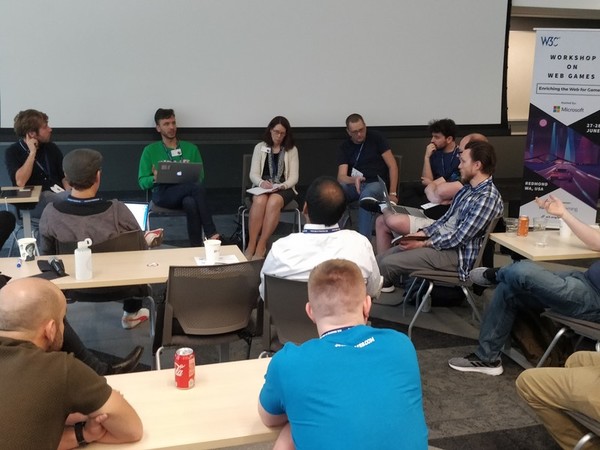News
W3C Workshop Report: Web Games
2 August 2019 | Archive
 W3C is pleased to announce a report from the W3C Workshop on Web Games held in late June 2019, in Redmond, WA, USA.
W3C is pleased to announce a report from the W3C Workshop on Web Games held in late June 2019, in Redmond, WA, USA.
The workshop convened about 100 participants representing browser vendors, game engines developers, games developers, game distributors, and device manufacturers. Together, they discussed the future of Web technologies for games. The report collects highlights from the individual sessions, with links to the presentation slides, and presents next steps envisioned by workshop participants. Video recordings of the talks are available and linked from the workshop agenda.
Workshop participants singled out better support for threading for 3D rendering and advanced audio processing as a core need to run AAA content on the Web. They also discussed proposals to improve support for cloud gaming scenarios, including proposals to reduce I/O latency and improve communication in real-time between clients and servers. Technical updates that would benefit the Web games ecosystem as a whole were identified and the workshop proved very useful to run broader discussions on discoverability, monetization, hosted Web runtimes and accessibility. These discussions may warrant the creation of a games activity at W3C to coordinate inputs from the games community, pursue broader discussions, and track progress on needs identified during the workshop.
We thank Microsoft for hosting, Facebook Gaming for sponsoring, the Program Committee for organizing the event, and all participants for their contributions.
Call for Review: Accessibility Conformance Testing (ACT) Rules Format 1.0 is a W3C Proposed Recommendation
30 July 2019 | Archive
The Accessibility Guidelines Working Group (AG WG) has published Accessibility Conformance Testing (ACT) Rules Format 1.0 as a W3C Proposed Recommendation. This draft demonstrates implementations of the specification based on example ACT Rules being continuously developed by the ACT Rules Community Group. A blog post Harmonized Accessibility Testing provides more background on this work.
Comments are welcome through 24 September 2019. Read about the the W3C Web Accessibility Initiative (WAI).
Updated Candidate Recommendations for CSS Writing Modes Levels 3 and 4
30 July 2019 | Archive
The CSS Working Group invites implementations of updated Candidate Recommendations of CSS Writing Modes Level 3 and CSS Writing Modes Level 4. These documents define CSS support for various international writing modes, including left-to-right and right-to-left text ordering as well as horizontal and vertical orientations. Level 4 is identical to Level 3, except that it contains the previously at-risk features which were dropped from Level 3 and an additional set of changes.
CSS is a language for describing the rendering of structured documents (such as HTML and XML) on screen, on paper, in speech, etc.
Updated Candidate Recommendation for Verifiable Credentials Data Model 1.0
25 July 2019 | Archive
The Verifiable Claims Working Group invites implementations of an updated Candidate Recommendation of Verifiable Credentials Data Model 1.0. Credentials are a part of our daily lives; driver’s licenses are used to assert that we are capable of operating a motor vehicle, university degrees can be used to assert our level of education, and government-issued passports enable us to travel between countries. This specification provides a mechanism to express these sorts of credentials on the Web in a way that is cryptographically secure, privacy respecting, and machine-verifiable.
First Public Working Draft: Timing Entry Names Registry
23 July 2019 | Archive
The Web Performance Working Group has published a First Public Working Draft of Timing Entry Names Registry. This document provides a registry of
PerformanceEntry.entryType
used in Performance Timeline [
PERFORMANCE-TIMELINE-2
].
